 Murder at the White Palace (Sparks & Bainbridge, #6) by Allison Montclair
Murder at the White Palace (Sparks & Bainbridge, #6) by Allison Montclair Format: eARC
Source: supplied by publisher via Edelweiss
Formats available: hardcover, ebook, audiobook
Genres: historical fiction, historical mystery
Series: Sparks & Bainbridge #6
Pages: 320
Published by Minotaur Books on July 30, 2024
Purchasing Info: Author's Website, Publisher's Website, Amazon, Barnes & Noble, Kobo, Bookshop.org, Better World Books
Goodreads
In post-WWII London, the matchmakers of The Right Sort Marriage Bureau are involved in yet another murder.In the immediate post-war days of London, two unlikely partners have undertaken an even more unlikely, if necessary, business venture—The Right Sort Marriage Bureau. The two partners are Miss Iris Sparks, a woman with a dangerous—and never discussed—past in British intelligence and Mrs. Gwendolyn Bainbridge, a genteel war widow with a young son entangled in a complicated aristocratic family. Looking to throw a New Year’s Eve soiree for their clients, Sparks and Bainbridge scout an empty building—only to find a body contained in the walls. What they initially assume is a victim of the recent Blitz is uncovered instead to be a murder victim—stabbed several times.To make matters worse, the owner of the building is Sparks’ beau, Archie Spelling, who has ties to a variety of enterprises on the right and wrong sides of the law, and the main investigator for the police is her ex-fiancée. Gwen, too, is dealing with her own complicated love life, as she tentatively steps back into the dating pool for the first time since her husband’s death. Murder is not something they want to add to their plates, but the murderer may be closer to home than is comfortable, and they must do all they can to protect their clients, their business and themselves.
My Review:
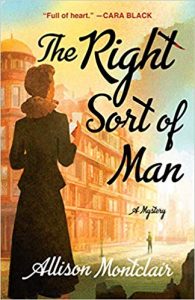 Over the course of the Sparks & Bainbridge series, beginning with The Right Sort of Man, Iris Sparks and Gwen Bainbridge have proven to have a very strange kind of luck. The sort of luck that has them tripping over murder victims – or in this case having a murder victim nearly drop on one of their heads. But that luck of theirs extends to not just finding the body – but also getting into the thick of the police investigation, involving themselves with the mob, AND, most importantly, figuring out whodunnit.
Over the course of the Sparks & Bainbridge series, beginning with The Right Sort of Man, Iris Sparks and Gwen Bainbridge have proven to have a very strange kind of luck. The sort of luck that has them tripping over murder victims – or in this case having a murder victim nearly drop on one of their heads. But that luck of theirs extends to not just finding the body – but also getting into the thick of the police investigation, involving themselves with the mob, AND, most importantly, figuring out whodunnit.
Up until this case, that luck has extended to emerging from each case with all of their friends, colleagues and hostages to fortune – as well as themselves – relatively unscathed at the end.
This case breaks the last bit of that streak, as the body that drops on Gwen’s head at the beginning leads to Iris’ mobster boyfriend near-death as the result of a gunshot in the middle. Center mass, in fact, but enough of a smidgeon of that luck kept that bullet from his heart. Not that recovery from a through-and-through shot to one lung is going to make his recovery a walk in the park – if he recovers.
Iris wants to murder whoever shot her man – but Gwen is there to keep her friend from going off half-cocked on a revenge spree. Leaving Gwen to do most of the investigation and surprisingly all of the derring-do in Sparks & Bainbridge’s very personal quest to figure out who murdered the body that dropped in the beginning AND who is doing their damndest to make sure that Archie Spelling is interred in a coffin beside him.
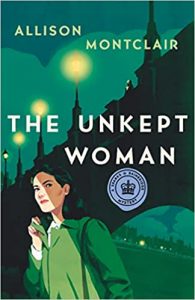 Escape Rating A+: I was up until 3 am finishing this, so an A+ it most definitely is. I tried telling myself I could finish AFTER breakfast, but myself wasn’t listening. I simply HAD to find out whodunnit!
Escape Rating A+: I was up until 3 am finishing this, so an A+ it most definitely is. I tried telling myself I could finish AFTER breakfast, but myself wasn’t listening. I simply HAD to find out whodunnit!
This entry in the series represents a turning point, as well as a bit of trading places. Up ’til now, Iris Sparks, former spy or whatever secret things she did during the war for whatever secret agency, was always the intrepid and daring partner, rushing in where angels rightfully feared to tread.
Gwen Bainbridge, on the other hand, was the cautious and conservative half, fearing – rightfully so – that if they cocked too much of a snook at the conventions that she would be made to pay for it in ways that have hung over her head like the Sword of Damocles in the previous books in the series.
Their positions reverse here, as Gwen is now out from under the restrictions of both her late husband’s family AND the Lunacy Court, while Iris is searching for approval – or at least understanding – from her disapproving mother and Archie’s extended family – only one of which is EVER likely to be on offer.
The police don’t want to listen to either of them – which is par for the course. Not only do the coppers not enjoy being shown up by a couple of amateurs, but Iris’ relationship with a mob boss and Gwen’s partnership with Iris, her friendship with Archie, and the friendly relations she has with Archie’s gang, tar both women with the brush of criminality.
Also, the police don’t seem to be all that interested in investigating Archie’s shooting. They don’t care much if one mobster rubs out another – they’re only worried about the potential for mob warfare that seems likely to follow.
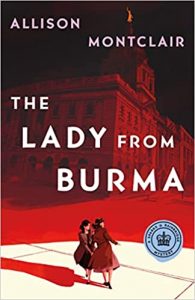 But the case itself isn’t so much about Archie as it is about Archie poking his nose in places that it doesn’t belong. It’s about the past – and not even Archie’s own. While Archie is fighting for his life in the hospital, and Iris Sparks is emotionally flailing about the potential loss of a future she wasn’t sure that she wanted until it was nearly snatched out of her hands – it’s up to Gwen Bainbridge to get to the bottom of the case that literally dropped on her head.
But the case itself isn’t so much about Archie as it is about Archie poking his nose in places that it doesn’t belong. It’s about the past – and not even Archie’s own. While Archie is fighting for his life in the hospital, and Iris Sparks is emotionally flailing about the potential loss of a future she wasn’t sure that she wanted until it was nearly snatched out of her hands – it’s up to Gwen Bainbridge to get to the bottom of the case that literally dropped on her head.
While the case does get wrapped, the story of Iris Sparks and Gwen Bainbridge and the Right Sort Marriage Bureau screeches to a halt with the pop of a champagne cork as 1947 is ushered in on a tide of desperate hope and wild expectation.
This reader, at least, desperately hopes that the next entry in the Sparks & Bainbridge will drop on her head this time next year. It’s not merely a matter of expectation – I absolutely HAVE to know what happens next.

 The Price of Redemption (Tides of Magic, #1) by
The Price of Redemption (Tides of Magic, #1) by  But one of the most respected AND popular ‘spin offs’ from this particular war is the
But one of the most respected AND popular ‘spin offs’ from this particular war is the  Ivy, Angelica, Bay by
Ivy, Angelica, Bay by 
 Ghostdrift (Finder Chronicles #4) by
Ghostdrift (Finder Chronicles #4) by  Over the course of the series (
Over the course of the series ( Escape Rating A+: June is Audiobook Month, and this final book in the
Escape Rating A+: June is Audiobook Month, and this final book in the  Together, those three plots, Belos’ need for closure, Captain Ahab – actually Captain Todd – following Belos where no one REALLY should have gone before, or again, and all the crews stuck on their very own tiny Gilligan’s Island planetoid, doing their best – or worst – to get along well enough to get back home.
Together, those three plots, Belos’ need for closure, Captain Ahab – actually Captain Todd – following Belos where no one REALLY should have gone before, or again, and all the crews stuck on their very own tiny Gilligan’s Island planetoid, doing their best – or worst – to get along well enough to get back home.
 Service Model by
Service Model by 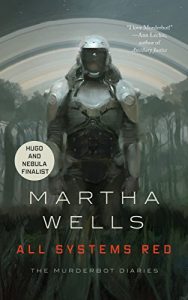 Escape Rating A+: I went into this completely unsure of what to expect, and that blurb of
Escape Rating A+: I went into this completely unsure of what to expect, and that blurb of  Fiasco (Uncharted Hearts, #2) by
Fiasco (Uncharted Hearts, #2) by 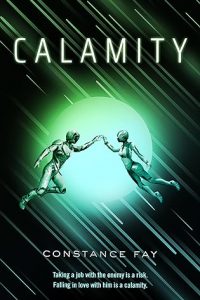 Escape Rating A+: They still have me at Serenity. Seriously, the resemblance to
Escape Rating A+: They still have me at Serenity. Seriously, the resemblance to  Fatal Enquiry (Barker & Llewelyn, #6) by
Fatal Enquiry (Barker & Llewelyn, #6) by 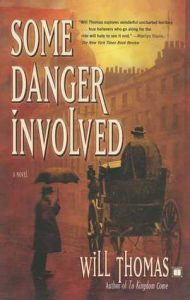 Most of the entries in the
Most of the entries in the  What makes the story rise to an A+, at least for this reader, was the delicious irony of the ending. Nightwine returns to London with deep, well-laid plans to eliminate Barker. Barker, forced to react rather than plan, still manages to maneuver Nightwine to what he believes will be his enemy’s downfall. It’s only after the results of that inevitable confrontation have been dealt with that Barker learns that both he and Nightwine have both been played by someone neither realized was even studying their board – let alone running it.
What makes the story rise to an A+, at least for this reader, was the delicious irony of the ending. Nightwine returns to London with deep, well-laid plans to eliminate Barker. Barker, forced to react rather than plan, still manages to maneuver Nightwine to what he believes will be his enemy’s downfall. It’s only after the results of that inevitable confrontation have been dealt with that Barker learns that both he and Nightwine have both been played by someone neither realized was even studying their board – let alone running it.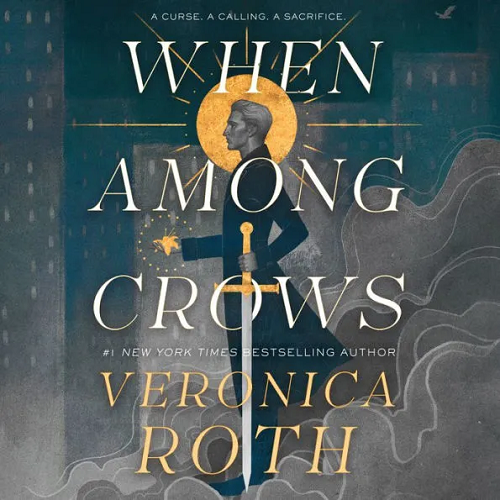 When Among Crows by
When Among Crows by  At the same time, the way this story drew in so many Slavic myths and legends that I itched for a mythopedia (I was driving, that would have had terrible consequences) reminded me, a lot and very fondly, of Neil Gaiman’s
At the same time, the way this story drew in so many Slavic myths and legends that I itched for a mythopedia (I was driving, that would have had terrible consequences) reminded me, a lot and very fondly, of Neil Gaiman’s 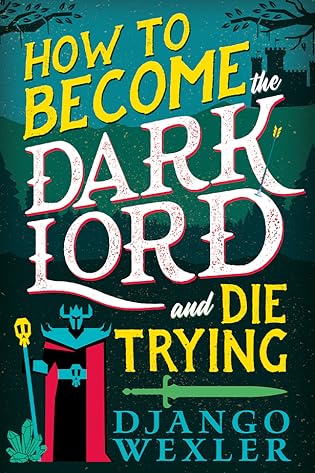 How to Become the Dark Lord and Die Trying (Dark Lord Davi, #1) by
How to Become the Dark Lord and Die Trying (Dark Lord Davi, #1) by  Because it’s not
Because it’s not 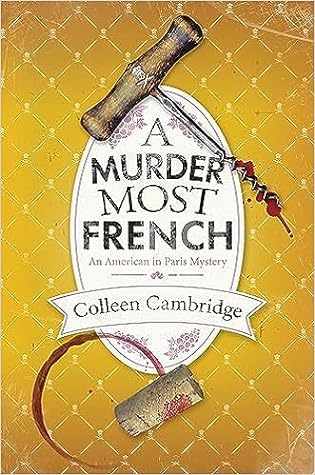 A Murder Most French (American In Paris Mystery, #2) by
A Murder Most French (American In Paris Mystery, #2) by  Julia Child is too busy learning French cooking, living her larger-than-life life in Paris AND at the beginning of writing her masterpiece,
Julia Child is too busy learning French cooking, living her larger-than-life life in Paris AND at the beginning of writing her masterpiece, 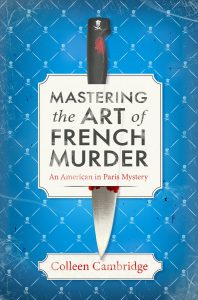 Escape Rating A+: If you loved the first book in this series – and who didn’t? – you will run, not walk to get this second book because it’s every bit as charming as the first. If you still need a bit of convincing, I’m going to get right to that.
Escape Rating A+: If you loved the first book in this series – and who didn’t? – you will run, not walk to get this second book because it’s every bit as charming as the first. If you still need a bit of convincing, I’m going to get right to that.